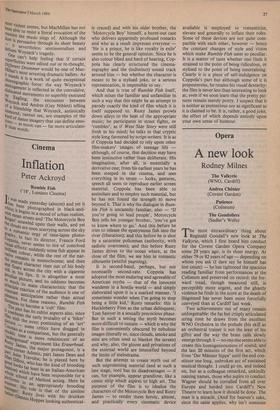Cinema
Inflation
Peter Ackroyd
Rumble Fish ('18', Lumiere Cinema)
t was made yesterday (almost) and yet it
has been photographed in black-and-
;9with it begins in a mood of urban realism, 14Mean streets and 'The Motorcycle Boy „eigns' m scrawled upon their walls, and yet i11 e clouds are soon scurrying across the sky 1!romantic orgy of time-lapse photo- ,1:1. In fact its director, Francis Ford visual oYla, never seems to tire of contrived brilliant effects: suddenly some fish appear in ratio llliant colour, while the rest of the nar- e remains in monochrome; and then and ci.,enrral character rises out of his body still' floats across the city with a cigarette in his lips. It is altogether a most
4-13.cuti .
ar picture, and its oddness becomes sp-h- rilueh its main characteristic that the coast reaction of the audience is one of Dit.,.,4stanr anticipation rather than actual threatens For these reasons, Rumble Fish 'ti„eatens to become a 'cult' film. it Inc Plot has its cultist aspects also, since fliZrnbines the surly brutality of a 'biker' Picture with the overt poeticising of an 'art C ure some critics have dragged in c'et,eall as a comparison, but the generally triud • `IY tone is more reminiscent of an derg Rusty r°11nd' experiment like Eraserhead. strut James, the major protagonist, is a Pan ;Corner Adonis, part James Dean and Matt J,(311,n Travolta; he is played here by goof; illon, who has the kind of brooding fash; 10 n, (at least in an Italian-American whole) which have been responsible for a Derf eritsch°01 of Method acting. Here he in. an appropriately brooding tee''' • HiOs role is that of the aimless father (Dennis Hopper looking authentical-
ly crazed) and with his older brother, the 'Motorcycle Boy' himself, a burnt-out case who delivers apparently profound remarks and who as a result impresses everyone 'He is a prince, he is like royalty in exile' seems to be the general opinion. Since he is also colour blind and hard of hearing, Cop- pola has clearly structured the cinema- tography and the (indistinct) sound track around him — but whether the character is meant to be a stylised joke, or a serious representation, is impossible to say.
And that is true of Rumble Fish itself, which mixes the familiar and unfamiliar in such a way that this might be an attempt to parody exactly the kind of film which it is itself supposed to. Rusty James prowls down alleys to the beat of the appropriate music; he participates in street fights, or 'rumbles', as if West Side Story were still fresh in his mind; he talks in that cryptic style long favoured by script-writers. It is as if Coppola had decided to rely upon other film-makers' images of teenage life although, of course, that decision may have been instinctive rather than deliberate. His imagination, after all, is essentially a derivative one; from his earliest years he has been steeped in the cinema, and sees everything in its terms — looks, gestures, speech all seem to reproduce earlier screen material. Coppola has been able to assimilate and to employ such material, but he has not found the strength to move beyond it. That is why the dialogue in Rum- ble Fish is uncannily familiar, also — 'If you're going to lead people', Motorcycle Boy tells his younger brother, 'you've got to know where to go.' And this before he tries to release the eponymous fish into the river (liberation); and this before he is shot by a saturnine policeman (authority, with sadistic overtones); and this before Rusty James drives to the ocean where, at the close of the film, we see him in romantic silhouette (wistful yearning).
It is second-hand, perhaps, but not necessarily second-rate. Coppola has adopted the most enduring and agreeable of American myths — that of the innocent wanderer in a hostile world — and simply elaborated upon it in a marked manner. 'I sometimes wonder when I'm going to stop being a little kid,' Rusty remarks: this is Huckleberry Finn as the urban delinquent, Tom Sawyer in a sexually precocious phase. But in such a setting the myth becomes more difficult to sustain — which is why the film is conveniently obscured by nebulous images (literally so, since clouds, smoke and mist are often used to blanket the screen) and why, also, the gloom and privations of the external world are intensified beyond the limits of melodrama.
But the attempt to create myth out of such unpromising material (and at such a late stage, too) has its disadvantages — it can, for example, appear grandiose, like a comic strip which aspires to high art. The purpose of the film is to idealise the characters of the Motorcycle Boy and Rusty James — to render them heroic, almost, and practically every cinematic device
available is employed to romanticise, elevate and generally to inflate their roles. Some of these devices are not quite com- patible with each other, however — hence the constant changes of style and vision which make Rumble Fish seem so peculiar. It is a matter of taste whether one finds it strained to the point of being ridiculous, or stylised to the point of being entertaining. Clearly it is a piece of self-indulgence on Coppola's part but although some of it is preposterous, he retains his visual dexterity: the film is never less than interesting to look at, even if we soon learn that the pretty pic- tures remain merely pretty. I suspect that it is neither as pretentious nor as significant as it is claimed to be. It is, rather, a good joke, the effect of which depends entirely upon your own sense of humour.










































 Previous page
Previous page